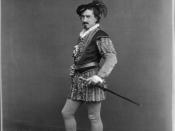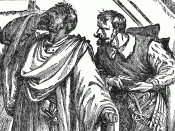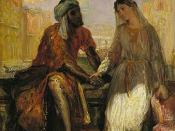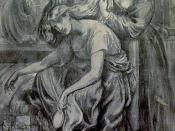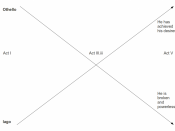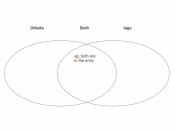Othello, written by William Shakespeare in the early 1600's, tells a tragic tale ofjealousy, revenge, deception, manipulation and above all, the ever withstanding battlebetween good an evil. Shakespeare provokes a thought towards the integrity of humannature and raises a dramatic comparison between human sensibility and the eruption ofmonstrous animal instincts. It is amusing, though disturbing, how detached societyremains from basic philanthropic deeds in the urge to achieve personal ambition andsatisfying vindictive and vengeful emotions towards a fellow man. Also, it is depressingto be made aware that the unnecessary divisions still existent within modern societybased on race and caste, have been carried down from centuries.
My response to Othello is a wry and critical one overall, as it has been shaped by my ownmodern social context. I have been provoked into thinking about the ironic andhypocritical stereotypes that divide society, and yet they seem to be perfectly justified asan accepted truth in the play.
I fail to see Shakespeare's, apparently solid foundation toexpress ideas regarding the flaws of human nature. He has perhaps been overshadowedby the necessity of providing a script which would appeal to a diverse range of audienceand to serve a primary purpose of entertainment, in the 1600's. However, this style ofpresentation is not necessarily attractive to readers or viewers of the 21st century and Icame to find it tedious in understanding and immaterial in ideology for modern societyreaders or viewers.
The play Othello raises many doubts towards its historical accuracy. Othello, the play'sprotagonist and, in a general way, hero, is a Christian Moor and General of the armies ofVenice. Othello holds weight in his character and carries a confident prowess inpersonality wherever he goes and in whatever he has to say. In spite of his high status, heremains easily drawn into insecurities because of his young age, his colourful life as asoldier, and particularly his obviously distinct race. His free-minded and open-heartedpersonality allows an attack from Othello's ensign and secret enemy, Iago. This buildsthe basis of the play. However, it is questionable as to why Shakespeare gave such a highposition to Othello in the first place. In the Elizabethan era, it was highly unlikely to haveany one from an alien race placed where Othello was. This raises the argument thatOthello's issues are superficial and driven by materialistic motivations for the sheerpurpose of entertainment. It is a common belief that Shakespeare used the tactic ofoffering a slight controversy to the audience in order to raise appeal to his plays andattract publicity.
The readers and viewers of modern society are put into confusion as to whether or not toaccept the seemingly exaggerated multi-cultural themes depicted in Othello. Not only dothey seem historically inaccurate, but are such a common part of today's modern society,that we take these ideas of racism and inter-racial relationships as nothing particularlyoutstanding. We are left with a production of almost caricatured plots and characters,who although have sincere morals to offer, are not taken seriously by modern readers orviewers.
On the brighter side, Othello offers a simple and clear depiction of themes and characters.
While they may not be very relevant or very amusingly presented, they are definitelyclear and obvious. The distinct characteristics of the Moor Othello, the innocentDesdemona, the good and friendly Cassio and of course the cunning and harshly evil Iagoset the colour of the play, much as would be expected from the direction or costumes.
Their distinguishing qualities stand out to the imagination, so that even in a state of notpaying attention to the characters, it becomes difficult to not think of their actions,sentiments or personalities. Even the differences between the character's personalitiesand attitudes are so immense and obvious that it offers almost a flavour to the script.
Greater still is the interweaving of influences passed on from character to character.
These influential confrontations between characters influence an interest in the play itself. In the forefront of the influential mind games is Iago. Iago held a lot of interest dueto his jumpy justifications of his vindictive actions. His occasional soliloquies throughoutthe play saw him communicating directly with the audience and giving explanations tohis actions, and sometimes his outlooks towards the scenario at hand. In the first scene heclaims to be angry at Othello for having not chosen him as lieutenant (line 7-32).
However, at the end of the same Act, he accuses Othello of having had an affair with hiswife, Emilia, "It is thought abroad that 'twixt my sheets / He has done my office" (scene 3line 369-370). However, none of these claims seem to justify Iago's deep hatred ofOthello, and towards his abusive language, it seems that his only primary motivation isracism. It also seems that his nature desires the satisfaction of causing pain and distress.
He is willing to take revenge on anyone at the slightest sign of threat or intimidation.
Iago uses his intellectual charms and persuasive abilities to manipulate other characters,and it seems that he takes great pleasure in this. He starts by manipulating the foolRoderigo by convincing him that he would help in winning Desdemona's love (Act 1,scene 3, line 349). His actual motive behind this is to scam Roderigo of his money. Hethen, and most chiefly, manipulates Othello into a severe, wild and monstrous jealousyand suspicion towards Desdemona, in a quest to take an unclear revenge.
The discussions between Emilia and Desdemona also highlight the colour ofcharacterisation Shakespeare presents us with. In contrast to the extreme innocence seenin Desdemona, Emilia is a wild hearted whore-like character, who vivaciously believes inher love for Iago but at the same time believes in the independence and liberation of awoman. She tries to convince Desdemona of the fundamental nature of a man to bedominant and suspicious. She unknowingly and unsuccessfully warns Desdemona of thecoming danger that Othello himself would present. While Queen Elizabeth was a female,to express such values in a female character in a public play was quite risky in it self.
Perhaps almost as risky as placing a moor at such a high position. However, as Othello'scharacter crumbled down to a pity, so did Emilia, ending with a less shameful, but just aspointless a death.
Michael Cassio, Othello's young and inexperienced lieutenant reflects Othello'sfundamentally good nature and eye to differentiate between good and evil. Cassio is theone character who tones down the high contrasts between the characters. He is presentedas down to earth and good natured, and on this basis is selected by Othello as lieutenant.
Iago involved Cassio in a drunken brawl which causes Cassio to lose his position. Iagofurthermore uses Cassio's youth, good looks, and friendship with Desdemona to play onOthello's insecurities about Desdemona's loyalty. Casio offers a bench mark to thereaders as a symbol of normality. Shakespeare, through Cassio, gives his message thatnormality is possible to exist, but the evils within us may emerge due to the callingactions of fundamentally evil persons.
Overall, the play Othello is a combination of ideologies and highlights of human natures.
While Shakespeare's presentation of his ideas may not have lasted with much appeal to amodern audience, particularly of the younger age, his wonderful characterisation anddramatisation can still be appreciated. However, Othello then only remains as a casualwork of entertainment, and its rather dreary and seemingly out-of-context melodramaBibliography:http://www.sparknotes.com/shakespeare/othello/www.shakespeare.mit.edu/othello/index.html
![From the Library of Congress: TITLE: Thos. W. Keene. Othello CALL NUMBER: POS - TH - 1884 .O7, no. 1 (C size) [P&P] REPRODUCTION NUMBER: LC-USZC6-58 (color film copy transparency) RIGHTS INFORMATION: No known restrictions on publication. MEDIUM: 1 print (](https://s.writework.com/uploads/9/94760/library-congress-title-thos-w-keene-othello-call-number-pos-thumb.jpg)
